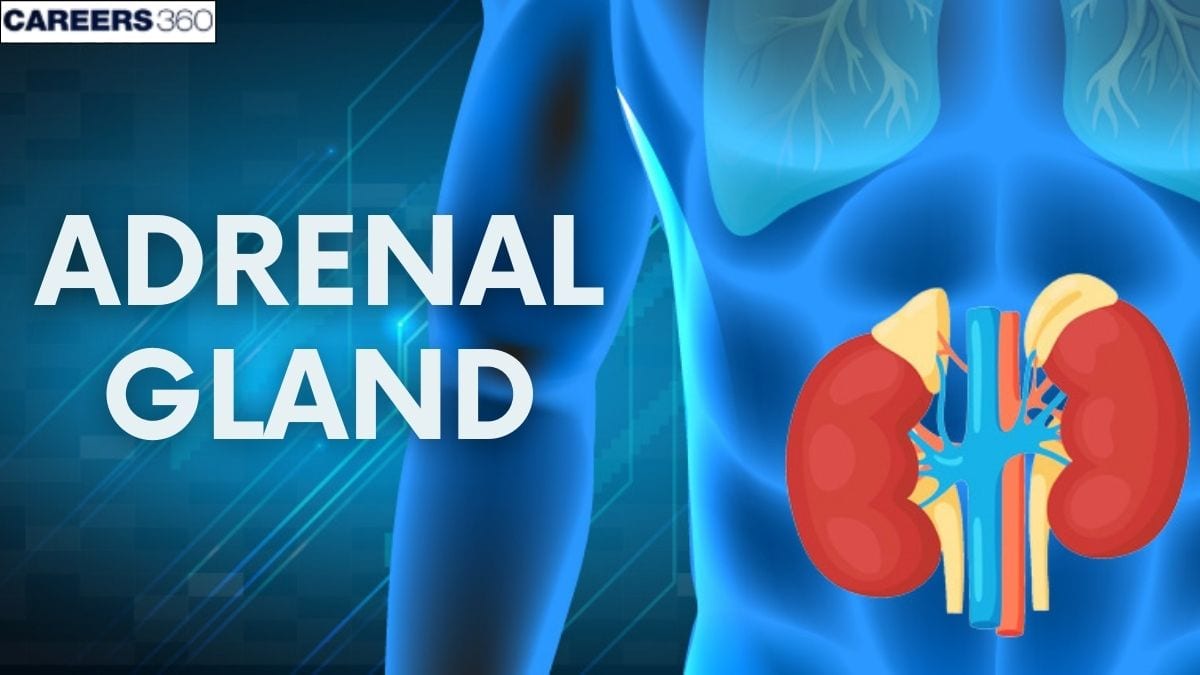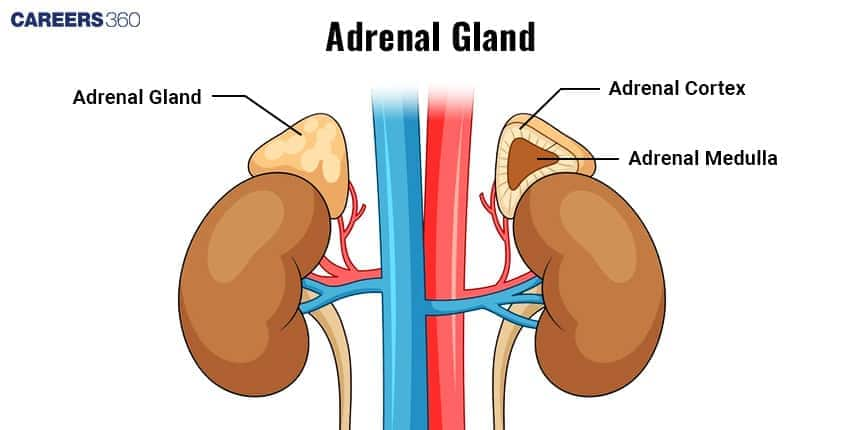Adrenal Gland - Symptoms, Function, Hormone
The adrenal glands are small endocrine organs located above the kidneys that secrete vital hormones like cortisol, aldosterone, and adrenaline. They regulate stress, blood pressure, and metabolism. Understanding their structure, control, and disorders is key for Class 12 Biology and NEET.
This Story also Contains
- Adrenal Gland
- Anatomy of the Adrenal Gland
- Functions of Adrenal Gland
- Hormonal Control & Feedback Mechanism
- Adrenal Gland Disorders
- Treatment & Management
- Adrenal Gland NEET MCQs
- FAQs on Adrenal Gland
- Recommended Video on Adrenal Gland

Hormones play a very important role in the chemical coordination and integration of the human body. They serve a range of functions in the body. The adrenal gland also releases certain important hormones. These glands are associated with the kidneys. Each adrenal gland is made up of two glands with different cell types, functions, and embryonic origins: the adrenal cortex, the outer portion, and the adrenal medulla, the central portion. The adrenal cortex consists of true endocrine cells, whereas the secretory cells of the adrenal medulla are derived from neural tissue during embryo development. Thus, like the pituitary gland, each adrenal gland is a fused endocrine and neuroendocrine gland.
Adrenal Gland
The adrenal glands are two small, triangular-shaped glands resting on top of each kidney. They help regulate several physiological activities by releasing several endocrine products, of which cortisol, adrenaline, and aldosterone are the most common. These hormones have functions associated with the management of stress, metabolic processes, blood pressure, and fluid balance. Any imbalance in these hormones causes disorders like Cushing's syndrome or Addison's disease, hence profoundly affecting the whole health status. Thus, it is important to know and understand the details of their functioning and regulations.
Anatomy of the Adrenal Gland
The two adrenal glands lie at the superior poles of the two kidneys.
Each gland is composed of two distinct parts, the adrenal medulla and the adrenal cortex.
The adrenal medulla, the central 20% of the gland, is functionally related to the sympathetic nervous system. The adrenal cortex form the rest, outer 80% of the gland.
Layers & Parts of the Adrenal Gland
Adrenal Cortex
The outer portion of each adrenal gland secretes corticosteroids.These hormones are all synthesized from the steroid cholesterol, and they all have similar chemical formulas.
However, slight differences in their molecular structures give them several different but very important functions.
The parts of Adrenal Cortex are:
Zona glomerulosa, a thin layer of cells that lies just underneath the capsule. These cells are secrete mineralocorticoids, for example aldosterone
Zona fasciculata, the middle and widest layer, constitutes the majority of the adrenal cortex and secretes the glucocorticoids, for example cortisol.
Zona reticularis, the deep layer of the cortex, secretes the adrenal androgens dehydroepiandrosterone (DHEA) and small amounts of estrogens.
Adrenal Medulla
The inner region of the adrenal gland, the adrenal medulla, is a modified sympathetic ganglion of the autonomic nervous system (ANS).
It is responsible for producing catecholamines, for example, epinephrine and norepinephrine, also called adrenaline and noradrenaline, respectively
The cells of the adrenal medulla secrete an unequal amount of these hormones—about 80% epinephrine and 20% norepinephrine.
The hormones of the adrenal medulla intensify sympathetic responses that occur in other parts of the body.
Functions of Adrenal Gland
Adrenal Cortex
Cortisol: This hormone plays a role in managing stress, regulating metabolism, and controlling inflammation.
Aldosterone: This hormone regulates sodium-potassium balance and helps in maintaining blood pressure.
Androgens: These contribute to the development of secondary sexual characteristics and also affect libido.
Adrenal Medulla Functions
Adrenaline: This elevates the heart rate, blood flow, and energy in response to stress.
Noradrenaline: This maintains the blood pressure and the fight-or-flight response to stress.
Hormonal Control & Feedback Mechanism
Hypothalamic-Pituitary-Adrenal (HPA) Axis
The role played by the HPA axis in the body's response to stress is very crucial.
Firstly, it releases cortisol, and then the release of Adrenocorticotropic Hormone (ACTH) from the pituitary gland maintains homeostasis through negative feedback.
Renin-Angiotensin-Aldosterone System (RAAS)
RAAS plays a very important role in blood pressure and fluid balance.
It is angiotensinogen that becomes converted into angiotensin II, which acts as a stimulus for aldosterone release and, therefore, regulates blood pressure and fluid retention.
Adrenal Gland Disorders
The disorders related to adrenal gland are caused by either over or under production of the hormones. Examples of the disorders are-
Cushing's Syndrome
The symptoms include excessive production of cortisol, often caused by a tumour of the pituitary gland or adrenal gland.
Weight gain, hypertension, diabetes, thinning of skin.
Elevated levels of cortisol in blood and urine; imaging studies.
Surgery, radiation, and medication to reduce cortisol levels.
Addison's disease
Insufficient cortisol and sometimes aldosterone production, often due to autoimmune destruction of the adrenal cortex.
Fatigue, weight loss, low blood pressure, and hyperpigmentation of the skin.
Low cortisol levels, ACTH stimulation test.
Hormone replacement therapy with cortisol and sometimes aldosterone.
Pheochromocytoma
Tumor of the adrenal medulla causing excess production of catecholamines.
Severe hypertension, headaches, sweating, and palpitations.
Elevated catecholamines in urine or blood, imaging studies.
Surgical removal of the tumour, and medication to manage symptoms.
Congenital Adrenal Hyperplasia
Enzyme production genetic disorders within the adrenal cortex lead to a hormonal imbalance.
Premature puberty; Adrenal insufficiency.
Replacement of Hormones and symptom management.
Treatment & Management
The treatment and management are described below-
Medications
Steroid Replacements: To be used in adrenal insufficiency, e.g., hydrocortisone, prednisone.
Antihypertensives: For hypertension, and also for some diseases like pheochromocytoma.
Surgical Interventions
Adrenalectomy: Surgical removal of one or both adrenal glands.
It is almost always indicated in tumours and very severe adrenal disorders.
Lifestyle & Diet
Dietary Adjustments: Sodium and potassium management, particularly in adrenal disorders.
Stress Management: Stress-combating techniques and therapies support one's well-being.
Adrenal Gland NEET MCQs
Q1. Which of the following is the hormone secreted by zona fasciculata?
Aldosterone
Cortisol
Androstenedione
Mineralocorticoids
Correct answer: 2) Cortisol
Explanation:
Cortisol is the hormone secreted by the zona fasciculata.
One layer of the adrenal cortex which is the outermost portion of the adrenal glands is called the zona fasciculata. Its main secretion is cortisol, a steroid hormone that plays several vital roles in the body's response to stress, inflammation reduction, and metabolism regulation. Additionally, cortisol supports immunological function and regulates blood sugar levels.
Hence, the correct answer is option 2) Cortisol.
Q2. Androgens are sexcorticoids secreted from
Zona glomerulosa
Zona reticularis
Zona fasciculata
None of the above
Correct answer: 2) Zona reticularis
Explanation:
Zona reticularis is the inner zone of the adrenal cortex that constitutes about 7% of the gland. Gonadocorticoids are secreted from this region. Sexcorticoids are secreted from zona reticularis
Hence, the correct answer is Option (2) Zona reticularis
Q3. Choose the incorrect statement
The adrenal medulla develops from the neuroectoderm.
Norepinephrine regulates blood pressure under normal conditions.
Norepinephrine is called an emergency hormone as it is secreted during the time of emergency.
The adrenal medulla consists of granular cells that are modified postganglionic cells of the sympathetic nervous system.
Correct answer: 3) Norepinephrine is called as emergency hormone as it is secreted during the time of emergency
Explanation:
Epinephrine or Adrenaline:
It is secreted at the time of emergency. Hence it is also called emergency hormone.
It has a greater effect on cardiac activity than norepinephrine.
It causes only weak constriction of the blood vessels of the muscles in comparison with a much stronger constriction that results from norepinephrine.
Both adrenaline and noradrenaline act on the cells of skeletal, cardiac and smooth muscles and blood vessels and fat cells.
Because of the role of their hormones, the adrenal glands are also called ‘glands of emergency’.
Hence, the correct answer is Option (3) Norepinephrine is called as emergency hormone as it is secreted during the time of emergency.
Also Read:
FAQs on Adrenal Gland
What is the adrenal gland?
The adrenal glands are small, triangular-shaped endocrine glands located on the top of each kidney. They are essential for maintaining body homeostasis. Each gland has two distinct parts – the adrenal cortex (outer region) and the adrenal medulla (inner region), both producing different sets of hormones. These hormones regulate stress response, metabolism, water balance, and blood pressure. For example, adrenaline helps the body respond to emergencies, while cortisol regulates glucose metabolism. Thus, adrenal glands are vital for survival and adaptation to stress.
What are the layers of the adrenal cortex?
The adrenal cortex is divided into three concentric layers, each secreting specific hormones:
Zona glomerulosa: Produces mineralocorticoids (e.g., aldosterone), which control sodium and water balance, thereby regulating blood pressure.
Zona fasciculata: Produces glucocorticoids (e.g., cortisol), which regulate glucose metabolism, stress response, and inflammation.
Zona reticularis: Produces androgens (sex hormones) that influence secondary sexual characteristics.
Which hormones are secreted by adrenal medulla?
The adrenal medulla, the inner portion of the adrenal gland, secretes catecholamines – adrenaline (epinephrine) and noradrenaline (norepinephrine). These hormones are secreted during stress or emergency situations, initiating the "fight-or-flight" response. Adrenaline increases heart rate, blood glucose levels, and respiration, while noradrenaline maintains blood pressure by vasoconstriction. Their release is controlled by the sympathetic nervous system. Hence, the adrenal medulla acts like an emergency center for the body.
What are common adrenal gland disorders?
Disorders of the adrenal glands can affect hormone secretion, leading to multiple health issues.
Cushing’s syndrome results from excess cortisol, causing obesity, hypertension, and muscle weakness.
Addison’s disease occurs due to underproduction of cortisol and aldosterone, leading to fatigue, weight loss, and low blood pressure.
Pheochromocytoma is a tumor of the adrenal medulla, causing excess adrenaline secretion and severe hypertension.
Congenital adrenal hyperplasia is a genetic disorder affecting cortisol and androgen balance, disrupting sexual development. These conditions often require lifelong medical management.
Recommended Video on Adrenal Gland
Frequently Asked Questions (FAQs)
The importance of the adrenal glands is that they release the hormones that are responsible for the well-being of the body. It prepares the body for mobilisation and also releases sexual hormones, which are important for survival.
The adrenal capsule is the protective layer of fat that covers the adrenal gland. It is not a part of the adrenal gland, but the function of the capsule layer is to protect the adrenal glands present on both sides of the body.
The treatments available for adrenal gland disorders are given below:
Change in lifestyle: Changing the lifestyle of the individual and practising healthy habits helps reduce stress and strain, mainly on the adrenal glands.
Hormone replacement therapy: In this treatment, similar hormones are displaced to restore the normal functioning of hormones to a beneficial range.
Medication: It is a treatment in which medicines and drugs are used for the prevention of diseases related to the adrenal gland. This is mainly used when the body is producing more hormones than required.
Tumour and cancer treatments: This treatment is used to remove tumours and related diseases like cancer that are producing more hormones.
Plastic surgery: This treatment helps to repair the structures and shapes affected by these diseases and excess hormone levels.

